






Dr John Whittington Chief Executive Officer
Salmon Tasmania recently announced a changing of the guard in its leadership, with Dr John Whittington to succeed Luke Martin as Chief Executive Officer.
The industry is pleased to have secured someone of Dr Whittington’s caliber and experience to build on Luke’s leadership.
As the newly appointed head of Salmon Tasmania, I am excited by the opportunity to be part of one of Tasmania’s most important industries and look forward to learning from and contributing to its continued success.
With a background in resource management, research and development and public administration, I step into this role with deep respect for the work already being done and a commitment to supporting innovation, sustainability, and transparency as we navigate the opportunities and challenges ahead.
Salmon farming plays a vital role in Tasmania’s economy, supporting thousands of regional jobs and contributing significantly to local communities across our state. From the processors and farm workers to the support


Luke has been an outstanding advocate for our industry over the past two years. He has led our industry with passion, skill and determination whilst navigating the challenging circumstances with Macquarie Harbour.
Without him, the West Coast community would be facing an uncertain future.
services and suppliers, our industry creates a ripple effect of economic activity that strengthens regional Tasmania.
As an industry, we have so much to be proud of. Tasmania has built a world-class aquaculture sector that produces premium salmon for domestic and international markets.
In telling our story, we must continue to be clear about how our industry operates, listen to our communities, and involve Tasmanians in shaping what comes next. This is about more than consultation—it’s about genuine partnership.
I believe that trust is built through open dialogue, honest communication, and a willingness to address challenges head-on. We will continue to share our data, explain our processes, and work collaboratively with

Luke leaves Salmon Tasmania with the respect and thanks of our industry from the very highest levels of our companies to the thousands of salmon workers and their families across the State.
I am pleased to now welcome Dr Whittington to the role.
Lyall Howard Chairman, Salmon Tasmania
communities, regulators, and stakeholders to demonstrate how our industry operates to the highest standards.
I’m looking forward to learning from and being part of Tasmania’s salmon industry as we continue to grow responsibly, with science, community, and integrity at the core of everything we do.
The future of salmon farming in Tasmania is bright, and I am excited to help support our industry as we work together to create sustainable prosperity for our state and communities.
We will remain focused on what matters most: producing highquality salmon while caring for our environment and the communities that support us.
Dr John Whittington CEO, Salmon Tasmania



Salmon Tasmania hosts a program of regular networking events called Ales & Salmon Tails. Ales & Salmon Tails is a casual get together for industry staff, stakeholders and supporters so if you haven’t attended one yet be sure to keep an eye out for the next one in your area.



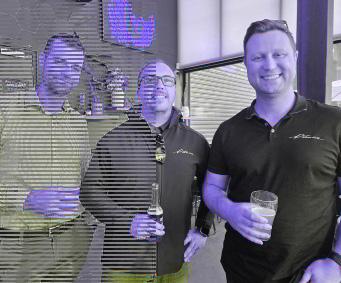



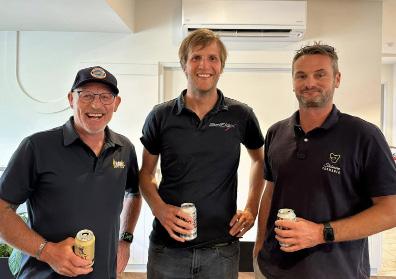
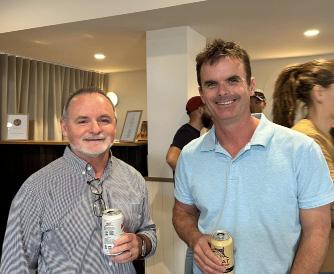


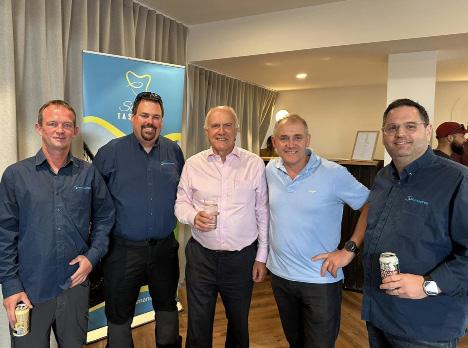























Click or scan to watch the video:











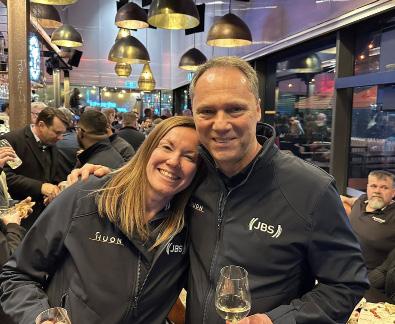


Click or scan to watch the video:


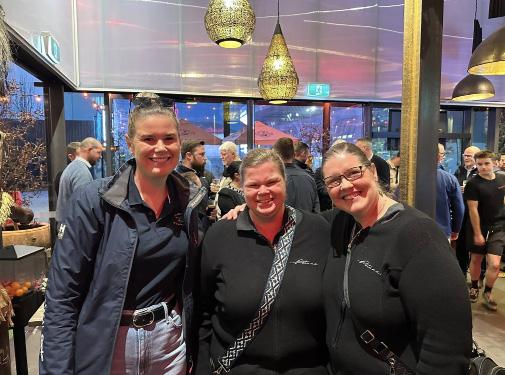


Our Responsibility
Our industry takes environmental responsibility seriously and operates under world-leading standards.
We thank the community for its understanding and recognise the tireless efforts of our farmers, scientists, and workers during what was a difficult time.
Earlier this year Tasmania’s salmon industry was hit by a seasonal mortality event in the state’s South-East.
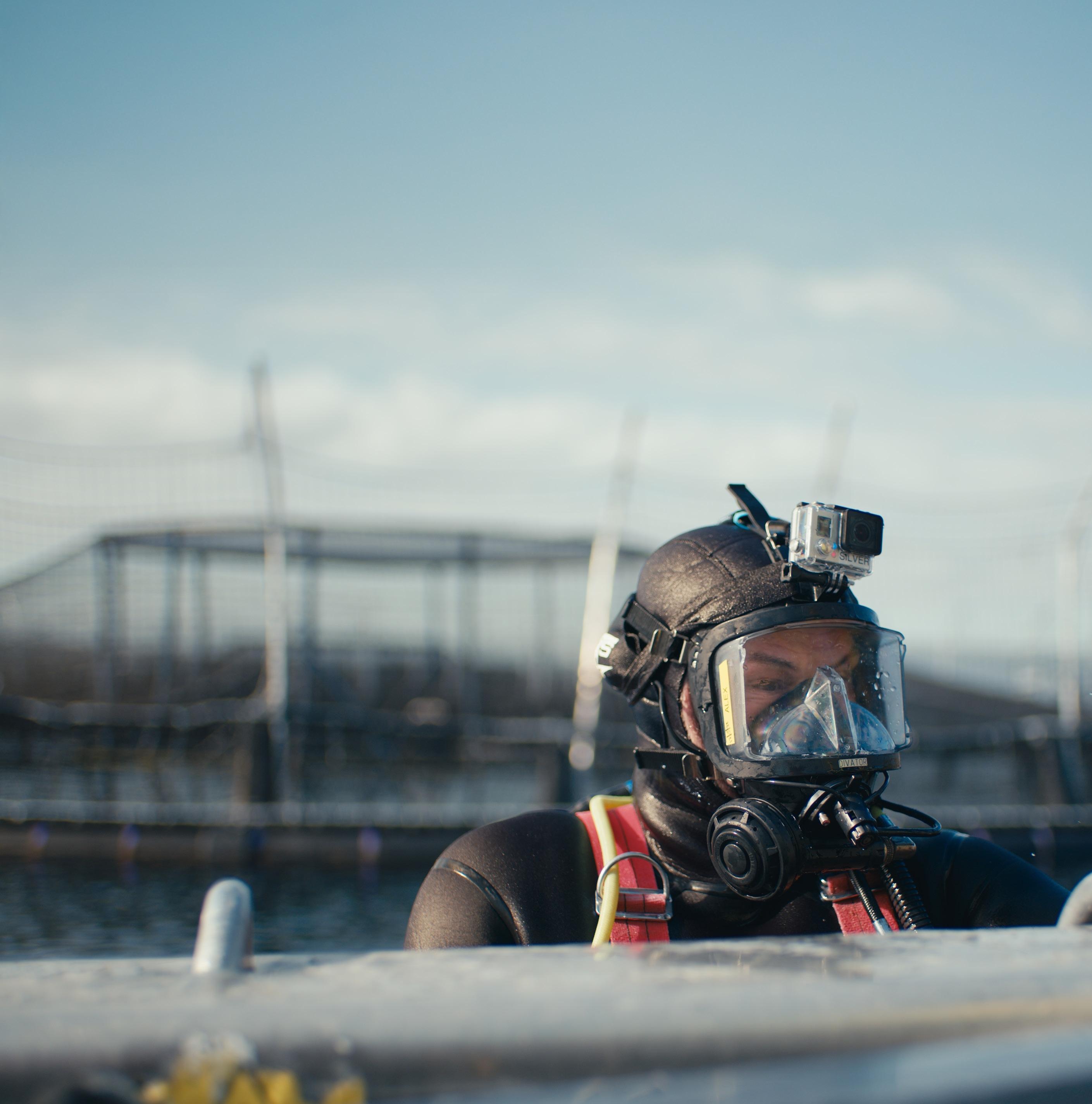
A microscopic marine bacteria, Piscirickettsia salmonis (P. salmonis) that is endemic to Tasmanian waters and just a millionth of a metre in size, impacted several salmon farms in the D’Entrecasteaux Channel.
Tasmania’s Chief Veterinary Officer has confirmed the microbe poses no risk to human health, wild fish, or the marine environment.
While industry always does its upmost to raise healthy fish, like other forms of farming, aquaculture isn’t immune to natural challenges.
Similar to how bird flu has disrupted egg supply or oyster mortality affects shellfish, our industry faces seasonal pressures and evolving threats. This incident was caused by a combination of two factors: warm summer conditions and a new strain of the bacteria.
Over summer, salmon face greater risks.
It’s why we vaccinate fish before they go to the sea, have strict biosecurity protocols and employ vets to to oversea all aspects of fish health.
Now that a vaccine has been developed, salmon going to sea are vaccinated against this strain, unlike the fish that were affected this summer.

Click or scan to watch the video:

The Tasmanian salmon industry is taking proactive and science-led steps to protect fish health and improve longterm resilience to P.salmonisand we assure the public that we are taking the following actions:
In partnership with leading scientists, we accelerated vaccine development targeted specifically at P. salmonis strains.
Just as human flu vaccines are continually improved, this work is about ensuring we have an effective and long lasting vaccine that protects fish from future outbreaks.
We’re continually investing in programs that grow stronger and healthier fish prior to them entering the sea.
This, combined with our smolt quality program, gives them the best start and reduces stress at a critical life stage.
We are continuously improving biosecurity protocols across all operations to reduce the risk of disease transmission.
This includes strict hygiene measures, movement controls, and real-time health monitoring. These measures help contain and limit the spread of bacteria such as P. salmonis during vulnerable periods, especially in warmer months.
Formulated feeds are enhanced to provide optimal nutritional support including key vitamins as a well-balanced diet is a cornerstone of fish health and disease resistance.
Veterinary antibiotics are used only when absolutely necessary and under expert supervision. Our goal is to support fish health while maintaining environmental responsibility and regulatory compliance.
Over time, our selective breeding programs aim to increase natural genetic resistance to P. salmonis in farmed salmon populations. This long-term strategy strengthens the overall health and resilience of fish stocks across generations.
Together, these initiatives reflect our commitment to sustainable, science-backed salmon farming that puts fish welfare, environmental care, and community confidence first.
ensuring the Tassie community is engaged at all ends of the state

From the colourful Dover Seafest to the family-fun A Tassal Day at the Park in Kingston, the Tassal community team have had a busy few months ensuring the Tassie community is engaged at all ends of the state.
Tassal is committed to building trust via strong and authentic relationships within the communities they operate in.
One of these sponsored events is the Mount Lyell Strahan Picnic! The dedicated committee organises the annual Mount Lyell Strahan Picnic, a treasured tradition on Tasmania’s West Coast since 1897.
The Picnic began as a reprieve for mining families in Queenstown and has evolved into a vibrant community celebration. The event brings locals and visitors together to honour history, foster connections, and create lasting memories.
Tassal became a sponsor many years ago as part of the committee’s effort to partner with businesses that value community and heritage. Tassal’s
involvement has become an integral part of the Picnic’s success, helping the team grow the event while keeping it accessible and inclusive.
Secretary Leigh Styles said Tassal’s support is significant and helps manage the volunteers’ workload.
“Tassal’s sponsorship allows us to offer free entry, activities, refreshments, and prizes, ensuring the picnic is inclusive for all. With Tassal’s support, we are able to keep entry free for all attendees, while our own fundraising efforts are used to replace ageing infrastructure and equipment.”
“It also means we can continue to organise and deliver the

event, bring the community together, and celebrate our shared history. Tassal’s sponsorship directly funds prizes, entertainment, and refreshments for attendees. Indirectly, it allows us to keep the Committee and the event sustainable, ensuring our longevity and contributing to the social, sporting, and community fabric of the West Coast.”
“Looking ahead, we’re excited to continue growing the Picnic’s legacy by reaching new audiences through digital platforms and preserving its history.
Tassal’s support is vital in helping us maintain the event’s inclusivity and appeal while ensuring its sustainability for future generations,” Mr Styles said.



Macquarie Harbour, known as parralaongatek in palawa kani, holds deep cultural and historical significance as the traditional land of the Toogee nation, including the Mimegin and Lowreene bands. It was also seasonally visited by the Ninene nation from the south-west and the Peternidic nation from the north-west.
Recently, Matt Barrenger, Salmon Tasmania’s Technical Director and a member of the Tasmanian Aboriginal community, joined Cradle Coast NRM, the Healthy Harbour Project, and members of the melaythenner teeackana warrana Aboriginal Corporation (mtwAC) on an on-country visit to parralaongatek.
The group, which included Tebrakunna Rangers, was led by Program Manager Jarrod Edwards, who was born on the West Coast and was involved with collecting the four adult Maugean Skates that initiated the IMAS captive breeding program.
Shortly after departing Strahan (traditionally known as timkarik), they paused at the King River delta to discuss how dam construction has altered the harbour’s hydrology, as well as the long-term impacts of mine tailings from the Queen River.
The group soon arrived at Sarah Island (langerrareroune), a former penal colony notorious for its harsh conditions. Less well known is its role between 1832 and 1833 as a holding site for fifty-five Toogee people, including fourteen children, who were forcibly removed from their lands and sent to

Wybalenna, Flinders Island, never to return. Sixteen people died and were buried on the island, making it a site of profound importance.
Walking the island’s paths while hearing these stories, told by the descendants of those incarcerated—was a deeply emotional and humbling experience.
Before departing, a smoking ceremony was performed: a cleansing ritual using the smoke of native plants to ward off bad spirits and strengthen the spir-

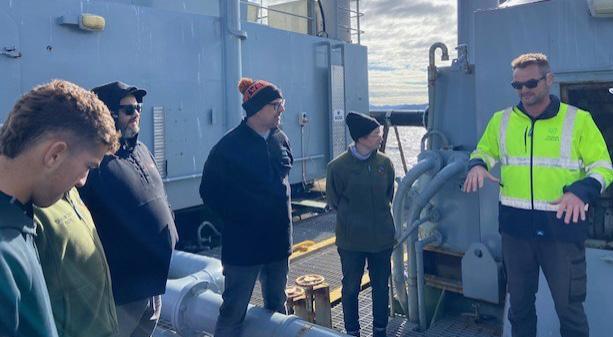

itual connection to ancestors and Country.
The group then toured ‘the Wombat’ barge, part of the Macquarie Harbour Oxygenation Project (MHOP)—a joint initiative by IMAS, FRDC, and Salmon Tasmania. Matt Barrenger and IMAS’s Jimmy Hortle explained how the barge improves oxygen levels by drawing in low-oxygen water, infusing it with saturated oxygen, and returning it to deeper areas—trialling the addition of oxygen to the deep water sections of this unique waterway. The trip concluded with a tour of nearby aquaculture
pens and a visit to Table Head, a key habitat location of the Maugean skate.
By all reports, exploring parralaongatek alongside Matt Barrenger and members of the melaythenner teeackana warrana Aboriginal Corporation was an inspiring experience—rich with knowledge-sharing, connection, and reflection.
The West Coast certainly remains a place of immense cultural and spiritual significance for Tasmania’s Aboriginal community.
At Huon Aquaculture, community engagement represents a commitment to making positive contributions and fostering relationships within the communities in which they operate.
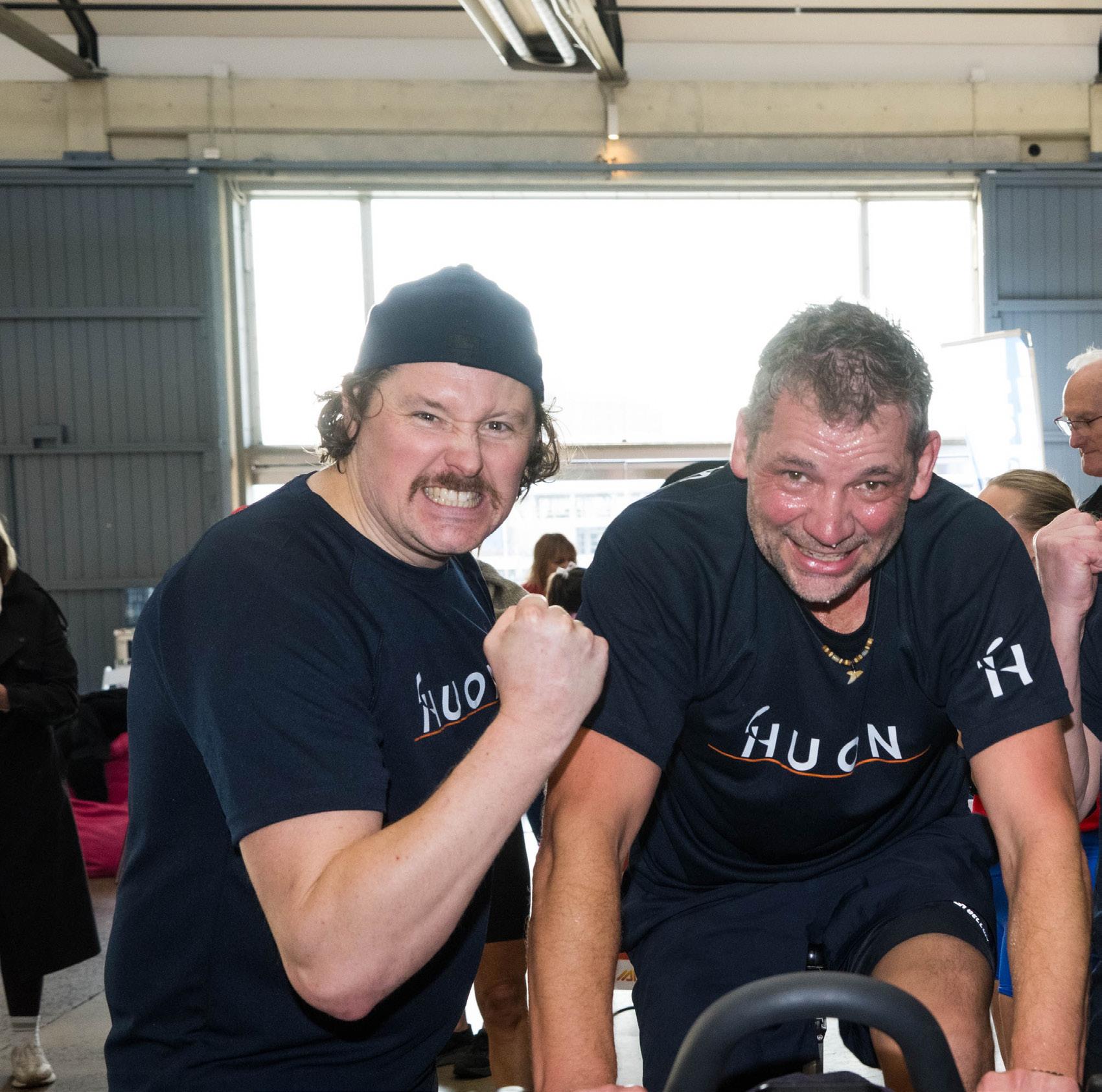
The Huon team proudly supports several local organisations, clubs, sporting groups, charities, schools and events.
Additionally, they host numerous site tours and quarterly Community Advisory Group meetings to ensure they are directly engaging and informing
local members of the community regarding our operational activities.
In 2024 alone, Huon Aquaculture supported over 70 local organisations across various initiatives, from grassroots clubs to larger charitable foundations.


The Huon team completed 25 school visits in partnership with Tasmania’s own JackJumpers through the delivery of the JackJumpers in Schools Program.
As part of this initiative, they provided nutritious lunches to hundreds of children and assisted JackJumpers players, coaches, and the beloved mascot, Jack the Jumper, in running basketball clinics at each school.
Environmental sustainability has always been a key focus within their community efforts, reinforcing this in the past year was the completion of 28 beach cleanups.
Huon also works to support those in need by donating fresh salmon fillets across southern Tasmania. With the help of
many dedicated team members and our partnerships with 12 emergency food relief providers, they distribute hundreds of kilograms of salmon each year, helping to supply vital protein to individuals and families facing food insecurity.
By the end of 2024, Huon donated over 1,000kg of salmon through their quarterly donation runs.
“We were extremely proud to have reached this milestone last year, and even more proud to have worked alongside 12 outstanding organisations that made it all possible, said Hannah Gray, General Manager Stakeholder & Government Relations.
“While we are so excited about all the community engagement milestones that we reached within the past year our story goes beyond just numbers, for us it is all about our relationships and how we can find our place as true partners of the community.
“With each year that follows Huon set our sights higher and strive to do more, as a company we are challenging ourselves constantly to grow, give more, and make a lasting impact” said Ms Gray.
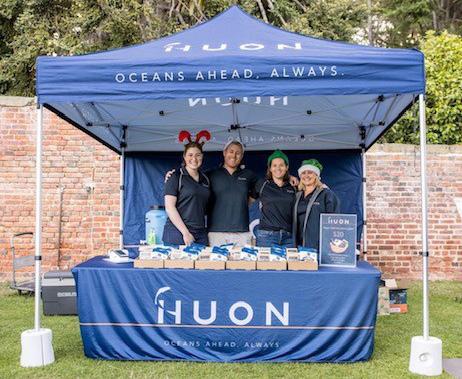
Petuna’s Partnership with Longino & Cardenal opens doors to European Gourmet Markets

Petuna is celebrating an ongoing successful partnership with Longino & Cardenal, an exclusive Italian distributor known for showcasing the world’s finest gourmet foods.
This relationship highlights Petuna’s global appeal and the exceptional quality of its salmon and ocean trout, and the dedicated craftsmanship of its Tasmanian teams.
The partnership began in 2019, following a visit from Longino & Cardenal’s Managing Director to Tasmania, who toured Petuna’s farming and production facilities.
Impressed by Petuna’s premium standards, Longino & Cardenal invited Petuna to become part of their exclusive portfolio, reserved for producers who meet the highest international quality criteria.

Jason Rengger, Head of Sales, remarked, “To be selected by Longino & Cardenal is a significant recognition of our meticulous standards and dedication to excellence.”
To officially mark this partnership, Petuna launched at Longino & Cardenal’s prestigious annual conference in Milan.
This launch event was organised in collaboration with the Department of State Growth and Austrade, featuring Tasmanian Chef Matt Breen from Sonny in Hobart, who showcased Petuna salmon and trout to an audience of distinguished chefs and gourmet experts.
“Events like these highlight Petuna’s position as a premium, globally recognised seafood brand,” Jason added. “Our teams take great pride in de-
livering consistent excellence from farm to table.”
Despite global disruptions caused by the COVID-19 pandemic, Petuna successfully adapted by supplying premium frozen products, maintaining its reputation and premium positioning in the European market. Another consignment for Longino & Cardenal will soon depart, solidifying Petuna’s status as a sought-after supplier in Europe’s gourmet food scene.
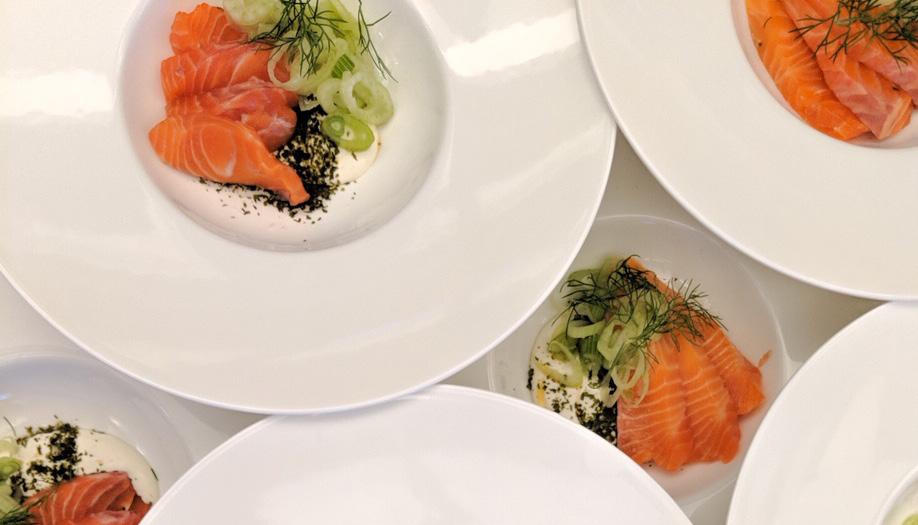


In a world increasingly focused on sustainability, Tasmania’s long-running Broadscale Environmental Monitoring Program (BEMP) delivers a rare and reassuring message.
After 15 years of intensive monitoring, the evidence shows no sustained ecosystem impact on water quality and seabed ecosystems in the D’Entrecasteaux Channel and Huon Estuary from salmon farming.
At the centre of this remarkable environmental success story is Aquenal Pty Ltd, a Tasmanian-based independent environmental consulting firm that has been involved in the program since its inception.
Under the guidance of Principal Scientist Joe Valentine, the team at Aquenal has spent the past 15 years aboard research vessels, overseeing the meticulous collection of environmental data that forms the backbone of the BEMP.
The BEMP was established in 2009 by the Tasmanian Government’s Department of Primary Industries, Water and Environment (DPIPWE), with input from expert marine scientists in the fields of water quality and sediment health.
What began as a local initiative to monitor the potential impacts of salmon farming has evolved into a globally significant environmental program. There are very few monitoring programs globally that moni-

tor aquaculture effects at such a broad scale outside the Allowable Zone of Effect (AZE) –and none can match the scale and longevity of the Huon and D’Entrecasteaux Channel BEMP. Similar BEMP programs now encompass all salmon farming regions in Tasmania.
“It’s not just about fish farming,” Joe says. “It’s about understanding the bigger picture—how these dynamic marine and estuarine systems are functioning over
time. Aquenal is very proud of our continued involvement in the Huon BEMP program. We recognise the importance of a long-term time series for assessing environmental change—it’s an extremely valuable dataset.”
Over the past 15 years, Aquenal’s field scientists have carried out over 240 consecutive monthly surveys.
That level of consistency is rare in environmental monitoring and is crucial for drawing meaningful conclusions about longterm change.
“We are particularly proud of our team’s ability to complete more than 240 consecutive monthly surveys,” Joe explains. “A robust dataset is vital to detect environmental change, so it’s essential that the data is collected consistently. Aquenal’s dedicated team adheres to stringent quality assurance pro-
cesses to ensure the integrity of the dataset.”
The work is demanding and highly technical. Each month, Aquenal staff collect data on water quality, nutrient levels, phytoplankton abundance and diversity, and sediment chemistry and biology—all key indicators of ecosystem health.
The BEMP is now a licence requirement of Tasmania’s Environmental Protection Authority (EPA), and its implementation continues to be supported by Salmon Tasmania, the industry body representing the state’s salmon producers.
So, what does the science say?
The most recent BEMP report for the D’Entrecasteaux Chan-
nel and Huon Estuary, published in July 2024, reinforces the region’s water quality and seabed ecosystems remain stable and healthy.
Water quality, including nutrient levels and physical parameters such as temperature and dissolved oxygen, has shown no significant directional changes.
Chlorophyll concentrations and phytoplankton composition, important indicators of nutrient enrichment, have remained stable, with no increasing trends. There has also been no evidence of an increase in harmful algal blooms.
Sediment chemistry metrics, such as redox potential and sulphide levels, have fluctuated slightly but show no signs of deterioration.
Benthic infauna—organisms that live within the seabed—
have shown no significant changes in abundance or community structure since monitoring began in 2009.
For Joe and the Aquenal team, BEMP isn’t just about numbers and graphs, it’s about making a difference and contributing to a program that respects and protects the broader environment.
“We’re out there every month, rain or shine. This kind of work requires passion and dedication, but the reward is knowing we’re contributing to a globally significant dataset that informs good management and policy decisions.”
Aquenal’s ongoing involvement and steadfast commitment have helped establish BEMP as a gold standard in environmental monitoring.


“We’re out there every month, rain or shine. This kind of work requires passion and dedication, but the reward is knowing we’re contributing to a globally significant dataset that informs good management and policy decisions.”
As Tasmania continues to balance aquaculture growth with ecosystem stewardship, Aquenal remains a steady presence behind the science, ensuring decisions are guided by rigorous, long-term evidence.
BEMP’s findings are publicly available on the EPA Tasmania website, offering transparency and accountability to all stakeholders.
The program’s open reporting structure has earned it credi-
bility among scientists, policymakers, industry, and the local community.
Monthly reports are submitted to the EPA, allowing for timely responses to any changes detected.
As BEMP moves into its sixteenth year, its legacy is more than a scientific achievement— it’s a testament to the power of collaboration and commitment. Thanks to the Aquenal team, Tasmania’s waterways are not only being protected—they’re being understood in a way few ecosystems in the world are.
To explore the full findings, visit the EPA Tasmania BEMP page.
Click or scan to watch the video:


The program’s open reporting structure has earned it credibility among scientists, policymakers, industry, and the local community.
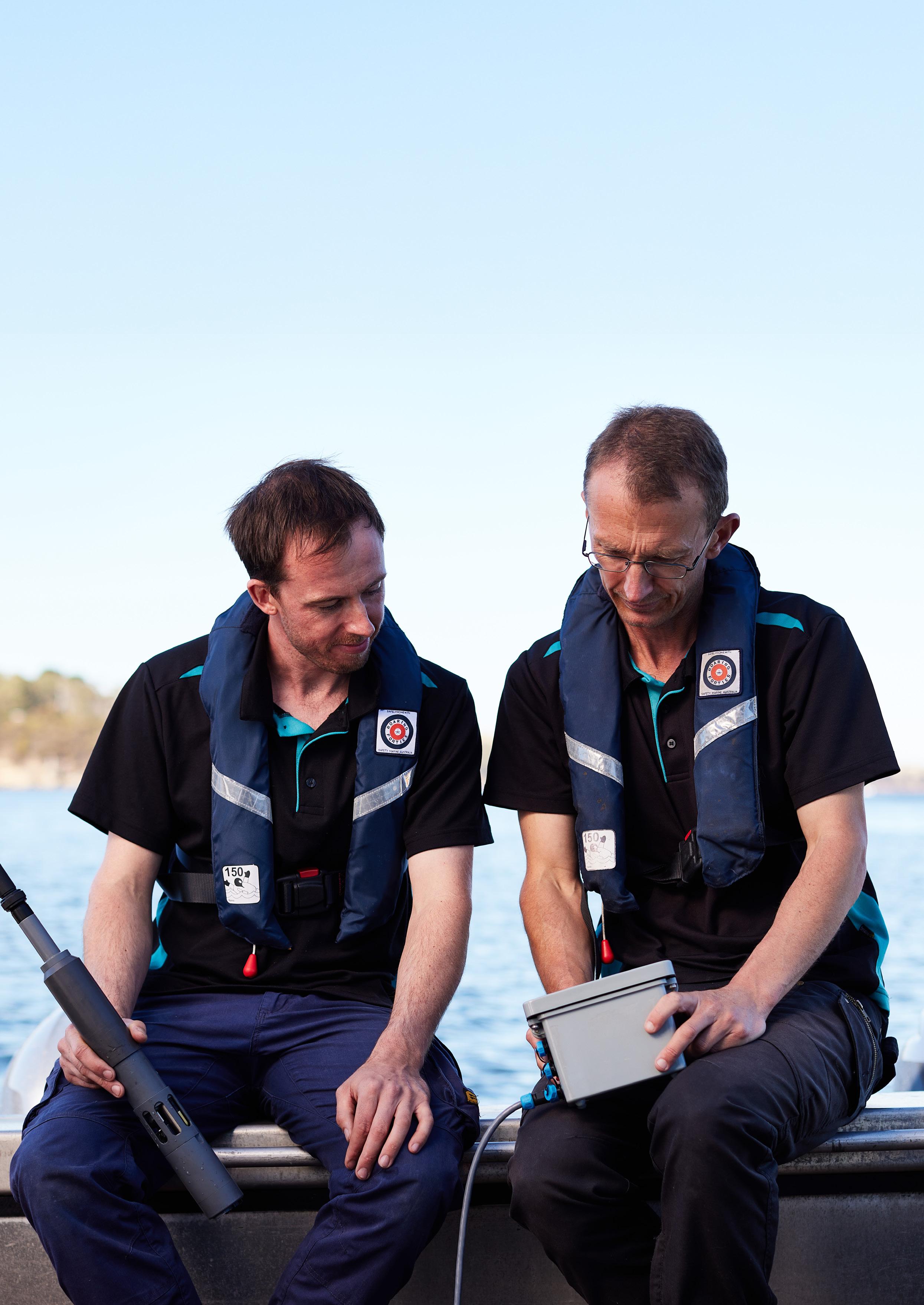
As BEMP moves into its sixeenth year, its legacy is more than a scientific achievement—it’s a testament to the power of collaboration and commitment. Thanks to the Aquenal team, Tasmania’s waterways are not only being protected—they’re being understood in a way few ecosystems in the world are.
through net donation

Petuna’s commitment to sustainability and environmental welfare has reached new heights with a donation from the Rowella Marine Farm to the Tasmanian Wildlife Hospital to support the recovery of injured raptor birds.
The donation includes close to 4,500 square meters of knotless polyethylene monofilament netting, carefully selected for its soft texture and small mesh size to prevent harm or entanglement to recovering birds.
These nets will play a pivotal role in constructing holding aviaries and flight tunnels, enabling raptor birds to rebuild
their strength and practice flying safely before release.
“This project is a perfect example of the circular economy in action.
Repurposing end-oflife equipment like these nets to support a vital cause and divert them from landfill is a win-win” said Rowella Farm Manager Cimarron Jackson.

Sustainability and protecting native wildlife are core to Petuna’s values, and contributing to raptor bird recovery aligns beautifully with those principles.
This donation ensures that these materials are not wasted, but instead are able to contribute to something meaningful.
By providing safe spaces for birds to recover, Petuna are helping to improve their chances of survival and eventually their release back into the wild.
Cimarron said the partnership with the Tasmanian Wildlife Hospital underscores Petuna’s dedication to fostering community connections

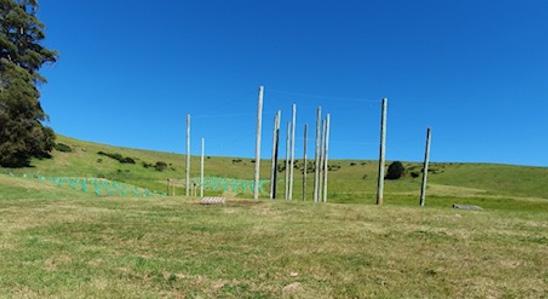
and promoting strong environmental stewardship.
“It’s exciting to know that our efforts directly support the rehabilitation of these incredible creatures and have a benefit for their recovery”.
This initiative marks an important milestone for Petuna’s sustainability journey.
Looking to the future, Cimarron said that the site plans to continue supporting raptor bird recovery and similar wildlife conservation projects.
“We hope this donation inspires others to think creatively about waste reuse and to support initiatives that protect and nurture the natural world.
“This partnership shows that through small changes in practice we can make a positive difference not only for wildlife, but also for the health of our shared environment.
“This project not only strengthens Petuna’s environmental goals but also reinforces the message that small, thoughtful actions can create a ripple effect of positive change,” Cimarron Jackson said

There is no sustainable aquaculture without sustainable feed.
To illustrate this point, approximately 80% of the greenhouse gas emissions from farmed fish can be attributed to feed production.
Sustainability in aquaculture cannot be assessed solely by evaluating the practices of fish farmers; the upstream impacts of feed production—spanning land use, biodiversity, human rights, and labour conditions—must also be considered.
Recognising this, the Aquaculture Stewardship Council (ASC) Feed Standard, introduced in 2023, was developed to address sustainability claims within the aquaculture industry.
The standard incorporates key principles found in other thirdparty sustainability certifications, setting requirements for employee relations, community engagement, environmental management, and ethical sourcing.
What sets the ASC Feed Standard apart is its industryleading approach to responsible ingredient sourcing, traceability, and social and environmental due diligence. It requires feed manufacturers to assess and mitigate risks related to deforestation, biodiversity loss, human rights, and labour conditions, ensuring suppliers meet strict sustainability and ethical criteria.
At its core is a structured due diligence risk assessment, which evaluates feed ingredients based on their environmental and social impact.
This structured approach enables feed producers to identify, manage, and report on risks, driving continuous improvement in responsible sourcing.
Over the past two years, several Skretting operating companies, including Chile, Norway, Ecuador, and North America, have undergone audits against the ASC Feed Standard, contributing to a growing internal knowledge base on its complex requirements.
In Q3 2024, Skretting Australia completed a formal desk review audit with external auditors from Bio-Inspecta, providing valuable insights into the process. As of January 2025, their full external audit is now complete.

Skretting have finalised all remaining requirements and are now awaiting the final steps to complete the process and achieve certification later this year.
Skretting Australia are proud to announce their significant progress in feed bag waste management through participation in the Australian stewardship program, Big Bag Recovery.
“This initiative has been instrumental in them meeting their sustainability commitments as a member of the Australian Packaging Covenant Organisation (APCO), including the ambitious target of recycling or composting 70% of plastic packaging waste by 2025.
Since joining the program in June 2024, we have successfully

collected 15,000 feed bags from Australian aquaculture farms, diverting nearly 50 tonnes of plastic from landfill.
This achievement marks a crucial step towards a more sustainable future for our industry.
“Feed bags have long been a problematic source of waste for Skretting and our partners. Although we are still in the infancy of this program, we are proud to be taking the first steps towards a responsible end-oflife solution for these bags, said Jenna Bowyer, Responsible Projects Manager at Skretting.
“Collaboration has been a key factor in the momentum we have gained so far. We are pleased to report that all members of the Tasmanian salmonid industry have now signed up to have their feed bags collected and recycled by the Big Bag Recovery programme said Jenna”
Over at Australian seafood producer Tassal, Heidi Smith,
Senior Manager - ESG highlights this impact “At Tassal, we are always looking for practical ways to reduce our environmental footprint. With no recycling options for feed bags in Tasmania, managing packaging waste responsibly has been a key focus of our Responsible Business Roadmap.”
“Partnering with Skretting and the Big Bag Recovery program has enabled us to responsibly reduce our waste footprint, ensuring our salmon feed packaging waste is managed within a circular waste stream where possible. It’s a great example of how industry collaboration can deliver meaningful environmental outcomes.”
Skretting look forward to building on the momentum gained in Tasmania, by employing this solution across the rest of Australia, contributing to a more sustainable Australian aquaculture industry.

Tassal’s sustainability journey began with their first Sustainability Report in 2011, which has since become a key platform for communicating their environmental, social, and governance (ESG) performance.
Over the years, Tassal have solidified their commitment to sustainability through their alignment with the United Nations Sustainable Development Goals (SDGs) and the development and implementation of their Responsible Business Roadmap.
As Tassal launch their 14th annual Sustainability Report, they are proud to share their science-based emission
reduction targets, validated by the Science Based Targets initiative (SBTi). This marks a significant milestone in their sustainability journey, exceeding their regulatory and certification requirements related to energy and emissions.
The Science Based Targets initiative (SBTi) is a collaborative effort between the United Nations Global Compact (UNGC), the World Resources Institute (WRI), and the World Wide Fund for Nature (WWF). Science-based targets (SBTs) provide a clear and credible pathway for businesses to set meaningful and actionable emissions reduction goals in line with the Paris Agreement.

By aligning their strategies with the latest climate science, Tassal is ensuring they operate as responsibly as possible while future-proofing their business growth.
Tassal’s achievement in setting and validating SBTs is particularly significant for the Australian aquaculture industry.
As the sector continues to grow, sustainable practices are essential for ensuring long-term success and environmental stewardship.

By setting SBTs, Tassal not only advances their sustainability journey but also sets a benchmark for other companies in the industry to follow.
This leadership helps drive the entire sector towards more responsible and sustainable practices, contributing to the overall health of marine ecosystems and the global fight against climate change.
The next step is to embark on a six-month project developing an actionable emission reduction roadmap informed by their annual GHG inventory to determine their businessas-usual emissions, identify reduction opportunities and the pathway to achieve their targets.
Tassal’s culture and people are champions of innovation and continuous improvement, all contributing to the delivery of their sustainability goals in different ways. Click or scan to read the report


Under the “Gotta Love Tassie Seafood” marquee hosted by Seafood Industry Tasmania, Petuna showcased Tasmania’s exceptional seafood at the Australian Wooden Boat Festival, drawing enthusiastic crowds to cooking demonstrations featuring the state’s renowned salmon and ocean trout.
Petuna partnered with Salmon Tasmania to deliver four cooking sessions. Audiences enjoyed dishes such as Miso-Glazed Salmon, Salmon and Roe Rolls, Ocean Trout Tray Bake and Ocean Trout Sashimi prepared by Petuna’s Brand Ambassador and Chef Tracey Martin.
“These recipes are designed to be simple, delicious, and showcase the versatility of Petuna’s salmon and ocean trout,” Tracey said.
“By using high-quality, easy-tosource ingredients, it’s easy to create meals that are both im-
pressive and achievable for any home cook.
“Quality seafood can elevate any dish. It’s wonderful seeing people discover how easy it is to make delicious seafood dishes at home.”
Samples and recipe cards proved very popular, with many attendees keen to recreate the meals themselves.
Jessica McInerney, Petuna’s Head of Public Affairs and Sustainability, highlighted the festival’s importance for brand visibility and consumer engagement.
“It’s always fantastic to connect directly with consumers,

showcase Petuna’s premium seafood products, and position our brand as part of Tasmania’s vibrant food and fibre industry,” Jessica said.
“Events like the Wooden Boat Festival allow us to engage with people who are passionate about local produce and reinforce the importance of sustainable seafood.”
Minister for Business, Industry, and Resources, Eric Abetz, attended and took home some recipe cards to recreate the meals in his kitchen.



As part of our ongoing efforts to enhance freight efficiency, Fresh Freight Tasmania has invested in brand-new Vawdrey A-Double trailers for operations in Tasmania.
These high-capacity trailers increase payload efficiency, reduce trips, and contribute to overall cost savings and environmental benefits.
“By utilising A-Doubles, we can deliver greater volumes of goods while maintaining our commitment to safety and sustainability, supporting Tasmania’s salmon industry’s growing logistics needs” said Michael Leonard, General Manager Business.
“Refrigeration technology is a cornerstone of our business, and we continuously strive to optimise our fleet’s cooling systems.
These new trailers are installed with cutting edge fridges ensur-
ing that our refrigerated transport solutions remain reliable and energy-efficient,” said Michael.
The newly installed HE-19 units offer superior temperature control, reduced emissions, and enhanced fuel efficiency, aligning with our goal of reducing our carbon footprint while maintaining the highest quality standards in refrigerated freight.
In line with Fresh Freight’s commitment to sustainability, they have recently installed solar panels at their Laverton North facility.
This investment in renewable energy not only lowers operational costs but also significantly reduces the company’s carbon emissions and therefore contributing to lower carbon emissions for the salmon industry. Another major milestone for

Fresh Freight Transport occurred on July 1, 2024, with the launch of their Brisbane operation in Archerfield, Queensland. This expansion enabled enhanced service reliability and efficiency when servicing all three salmon providers from Tasmania into Queensland markets.
With a dedicated presence in Brisbane, Fresh Freight Tasmania can now ensure timely and seamless logistics solutions for
not only salmon, but the broader seafood industry.
These investments and operational expansions play a crucial role in supporting the Tasmanian salmon industry.
By enhancing freight capacity and refrigeration technology, Fresh Freight is ensuring safe

and efficient transport of Tasmanian salmon to key markets, including Queensland.
Fresh Freight Tasmania takes pride in its workforce, directly employing 105 people and indirectly supporting 75 additional jobs with a significant portion of their employees Tasmanian, reinforcing their deep-rooted connection to the local community.


In recognition of International Women’s Day, Huon Aquaculture is proud to celebrate the remarkable women in our business who are shaping the future of aquaculture.
One of those inspiring individuals is Caitlin Ringuet, Huon’s Planning Manager, whose passion for science, innovation, and sustainability is making a significant impact on the industry.
“No one day is the same—that’s the nature of farming,”
“Our team works across the business, translating strategic plans into operational forecasts. We analyse data from every aspect of the company, supporting decision-making at all levels, including providing analytic insights to our executive team” Caitlin says.
Caitlin’s journey demonstrates the opportunities available for women in STEM, she is passionate about encouraging more women and girls to pursue careers in science and technology. “I’m excited about
Since graduating from James Cook University with a science degree majoring in aquaculture, Caitlin has forged a successful career in a field traditionally dominated by men. She joined Huon five years ago as a Planning Officer and within just six months, progressed to an analyst role. Today, as Planning Manager, she leads a dedicated team responsible for long-term biological and operational forecasting, ensuring the sustainability of Huon’s operations.
where aquaculture is heading, and I love seeing more women coming through and being supported, engaged, and heard,” she says. When asked what advice she would give to women and girls considering a career in STEM, Caitlin says,
“Always be curious, always be learning, and don’t feel like you have to hold yourself back. There are endless opportunities in this industry, and Huon leads in innovation and development. It’s a fantastic environment for growth.”
The importance of diversity in STEM fields cannot be overstated, and Caitlin’s leadership is a testament to the positive change happening in aquaculture. Her work not only contributes to Huon’s continued success but also paves the way for those to come.

Harrison Jenkins, a firstyear mechanical engineering apprentice at Petuna’s Cressy site, has been named “Outstanding First Year Apprentice” at the 2024 TasTAFE Trade Excellence Awards.
The TasTAFE Trade Excellence Awards recognised 57 exceptional learners from across Tasmania in fields ranging from construction to cookery and automotive to plumbing.
With ceremonies held in Devonport, Launceston, and Hobart, these awards brought together more than 500 learners, employers, sponsors, industry representatives, and TasTAFE staff to celebrate the successes of Tasmania’s apprentices and trainees.
Harrison’s journey to this achievement is as inspiring as the award itself. After starting his career on the fish side at Petuna, he transitioned into the Maintenance Team, quickly making his mark during a challenging period for the Cressy site.
His determination, natural aptitude for mechanics, and passion for aquaculture stood out from the start.
“From day one, Harrison has been an invaluable asset to our team,” said Jansen Peters, Maintenance Manager at Cressy.
“He joined us during the intense build phase of Cressy 3, and despite the pressures, he hit the ground running. His dedication to ensuring equipment runs smoothly, keeping fish thriving and people safe, is unmatched.
This award is well-deserved and a reflection of his exceptional attitude and work ethic.”
Harrison’s recognition at the TasTAFE awards highlights the importance of skilled trades in the aquaculture industry and reaffirms Petuna’s commitment to developing talent. As part of their focus on people development, Petuna provides training and mentorship opportunities to empower their team members to excel and achieve their career aspirations.
Reflecting on his award, Harrison said, “It’s an honour to be recognised among so many talented apprentices and trainees across Tasmania.
The support I’ve received from Petuna and my mentors has been incredible, and I’m excited to continue growing my skills and contributing to our industry.”
Harrison’s success is a testament to the strength of partnerships between employers, training organisations, and learners.
“Harrison exemplifies what we value at Petuna – a proactive attitude, a commitment to learning, and a passion for making a difference,” added Jansen. “We are excited to see him continue to thrive and contribute to both our team and the broader aquaculture industry.”
Harrison’s recognition highlights Petuna’s emphasis on developing skilled tradespeople within the aquaculture industry.
His achievement underscores the strength of vocational training partnerships and Petuna’s ongoing commitment to nurturing talent in Tasmania.
Congratulations, Harrison.
New multimillion dollar aquaculture development brings jobs to the Huon Valley

The team at Huon launched “Hulk” the 600T Storm Bay Region feed barge.
Hulk was launched after undergoing a feed system expansion and a maintenance period at Haywards, in Margate, Tasmania.
Starting in December 2024 the Hulk was slipped, had its feed systems overhauled and expanded, surveyed, generators and hydraulics overhauled and then painted.
This was done by Haywards, AKVA, Marine Hydraulics, Huon’s staff from Storm Bay, feed barge technicians and control systems engineers. These are the largest feed barges in operation here in Tasmania and are designed to work on our roughest sites.
Hulk also sports JBS Huon’s new low key all navy paint scheme that minimises the visual impact of our moored assets on the farming lease.
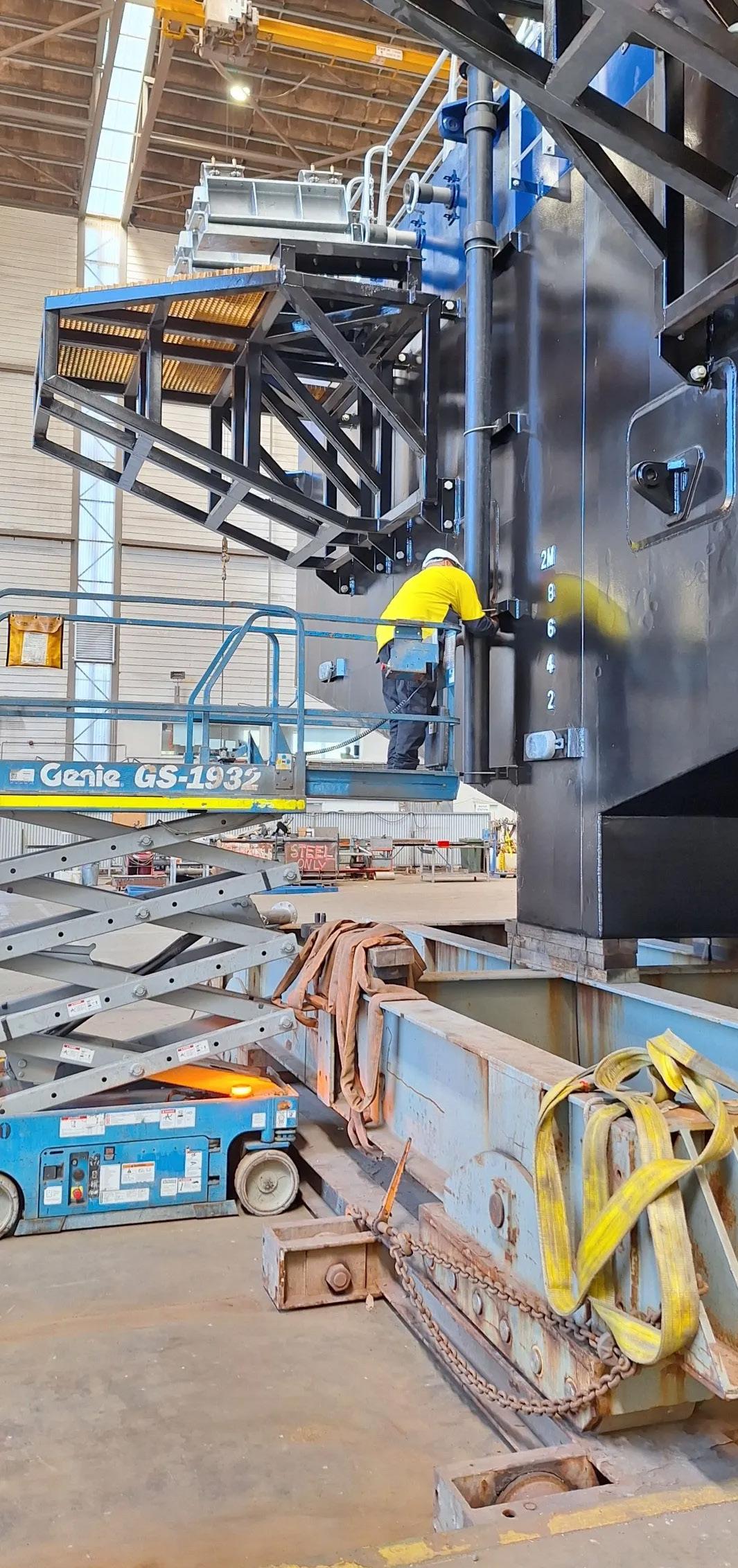

Salmon Tasmania held an event to farewell Henrique Batista who has left his current role as CEO of Huon Aquaculture to take up a new executive role in Pilgrims Europe.
Since arriving in Australia in mid-2023, Henrique has led the successful integration of Huon into the JBS Australia business, developed a new brand direction and led further investment in land-based farming.
We are delighted to announce that Charles von der Heyde, previously President, Pilgrim’s Mexico is relocating to Hobart, to take up the position as CEO of Huon.
Charles is a strong international executive with extensive experience across a range of businesses. He joined Pilgrim’s in February 2010 as Senior Vice President of Commodity Risk Management, Feed Ingredient Purchasing and Export Sales.
In January of 2012, he was promoted to President of Pilgrim’s de Mexico. Charles came to Pilgrim’s from Bunge LTD in Brazil, where he had worked for more than 29 years. Bunge, a leading agribusiness and food company with integrated operations
that circle the globe, is one of Brazil’s largest agricultural exporters, oilseed processors and wheat millers.
CEO JBS Australia Brent Eastwood thanked Henrique and the entire Huon team for their hard work and dedication to Huon and the growth and positive developments that have occurred in the business over the past 3 years.
He is looking forward to the team and Charles continuing forward in implementing the exciting plans and growth strategy that are in place for Huon.

The Mayala people gave their official consent for the Mayala Inninalang Aboriginal Corporation to enter into an Indigenous Land Use Agreement with Tassal.
This agreement provides native title consent for the granting of new aquaculture leases, enabling Tassal to expand its production of barramundi into the Buccaneer Archipelago.
Tassal General Manager of Corporate Affairs and Communities Tom Middleton said Tassal has a deep respect for the Mayala people’s strong connection to the sea country and islands in the Mayala IPA.
“We are so grateful to have had the opportunity to connect and work with Mayala and to benefit from their insights and deep understanding of the spectacular environment in the Mayala IPA.
We are honoured to have been given this vote of confidence in the commitments we make to caring for the environments we operate in and contributing positively to the communities.”
“This marks the next step of a long-lasting relationship and the team at Tassal look forward

to continuing to work together with Mayala to ensure future growth of our operations in this beautiful environment will be managed sustainably with economic benefits shared amongst the local community.”

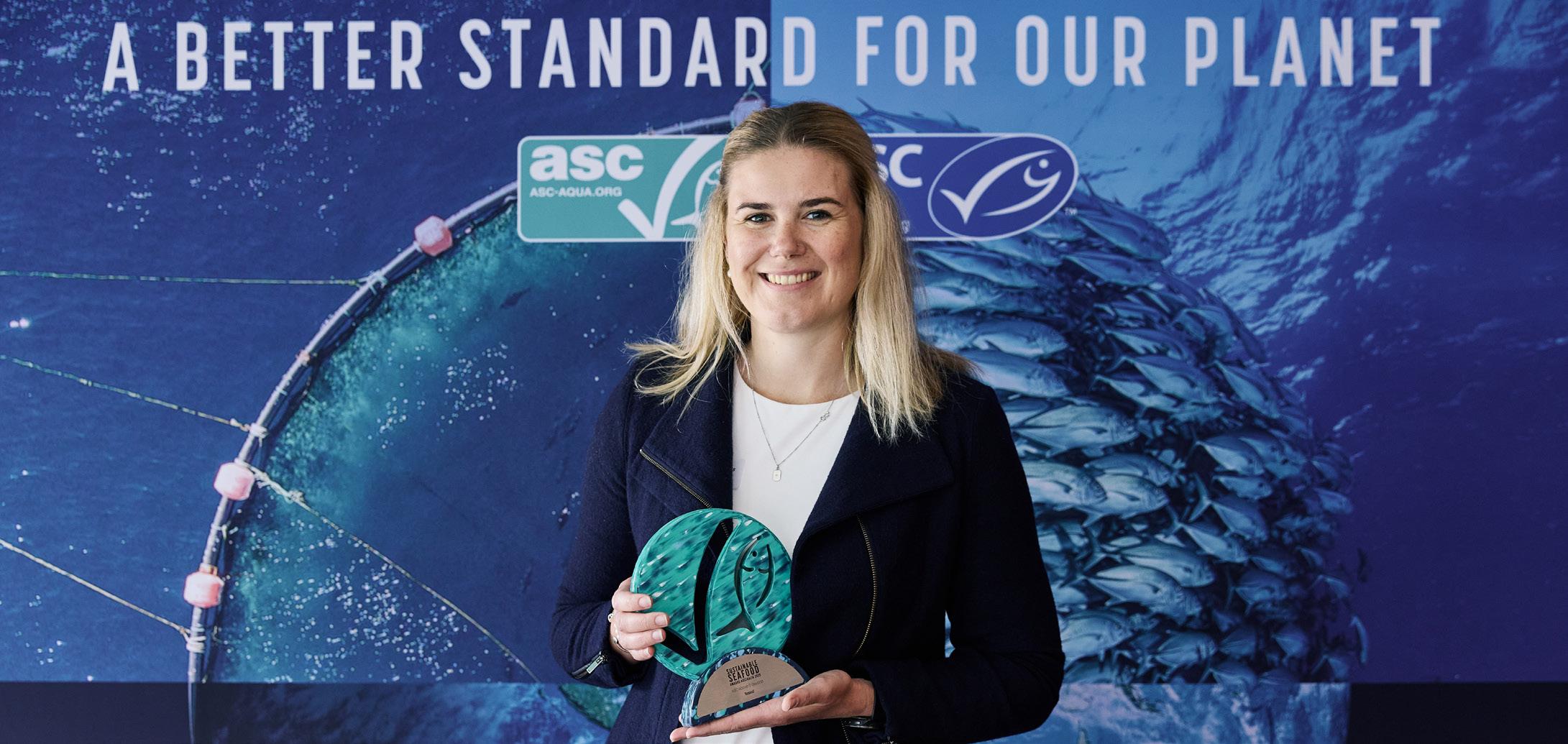

The team at Tassal were thrilled to take out awards at the recent National Sustainable Seafood awards held in Sydney.
Tassal continue to be recognised at this event and this year Archie Turvey from Triabunna in Tasmania was awarded Young Person in Aquaculture.
This is the fourth consecutive year Tassal has had one of its young people win this fantastic award.
Tassal also took out the Above and Beyond Award for their science-based target commitment and were highly commended as a Responsible Producer.
ESG Senior Manager, Heidi Smith, said Science-Based Targets (SBTs) provide a clear and credible pathway for businesses to set meaningful and actionable emissions reduction goals in line with the Paris Agreement.
“By aligning our strategies with the latest climate science, we can ensure we are operating as responsibly as possible and future-proof our business growth” she said.
Click or scan to watch the Interview:


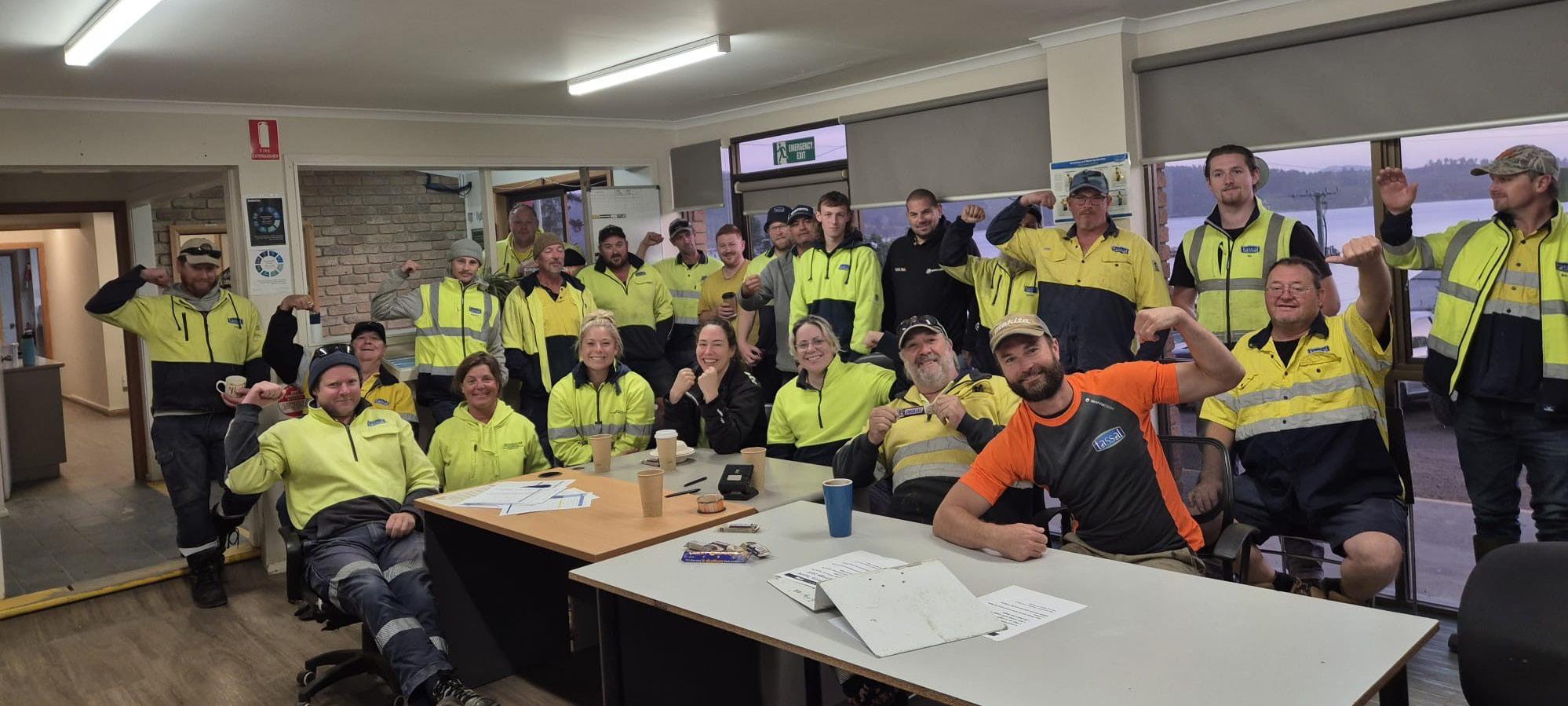
Tassal has again celebrated International Women’s Day across the business with sites running internal celebrations, attending inspirational events Australia-wide and sharing stories while discussing what the 2025 theme “Accelerate Change” means to them.
The Hobart Remote Operations Centre currently have a team of 50% women and the Southern Zone team also have a diverse
group, proving that there is an array of opportunities in the aquaculture industry for all.
Tassal’s commitment to gender equality is further demonstrated by participation in the WISA Turn the Tide program, with representatives from both farming and corporate sectors.
Click or scan to watch the interview:

The Tassal Corporate shoreline clean-up was aligned with Clean up Australia Day.
Teams participated from ESG, Environment, Purchasing, Margate Processing, WHS and P&C. With everyone’s efforts the Tassal team covered 9km of coastline at Channel, Bruny and Dover areas, collecting 0.3 m3 of waste, equivalent to approximately two household bins.
Further to this, Tassal Seafood worked with Visy, Australia’s largest integrated manufacturing and recycling business, for a more sustainable summer season with new locally made cardboard boxes for their delicious prawns for grocery and wholesale customers.
Tassal’s sustainable packaging goals see them on track to remove over 55,000 prawn polystyrene boxes with the launch of the fully recyclable 4kg prawn carton into grocery, and now this season the 10kg carton into out-of-home, earning recognition from the Aquaculture Stewardship Council and Australasian Packaging Innovation and Design Awards for sustainability efforts.




Tracey Jacobson
WHS Training Co-ordinator Tassal/Cooke - 3 years
Role and what I like most about it:
Tracey is the Tassal Workplace Health and Safety (WHS) and Training Coordinator at the Triabunna Processing site in Tassie where she is responsible for the important tasks of overseeing WHS and onsite training.
She said her days are always busy with plenty to keep her challenged, including the factory upgrade at Triabunna, but loves working with a group of great people.
Career history:
Tracey started as a casual two days a week and covered extra duties in the office. In early 2024 she transitioned into the role of WHS and Training.
Hobbies:
Camping, Beachcombing and swimming in the ocean and spending time with family and friends
Favourite band: Green Day is an old favourite, but I love lots of bands!
Favourite movie: An oldie! Blue Crush

Role and what I like most about it:
From repairing major infrastructure to checking gear and seeing some of the unreal sea life we’ve got down here in Tassie – no two days are the same.
But honestly, the best part of the job? The crew. I get to work with some top-notch people who give a damn –about the fish, the ocean, and doing things the right way.

Devine Supervisor 5 years
Career history:
I joined Huon in 2020 as a Diver, bringing with me experience from years spent working underground in the mining industry having been an environmental scientist for 20 years.
Hobbies:
Flying (yes I am a pilot) and doing ANYTHING with my son.
Favourite band: Any live music.
Favourite movie: Lord of the Rings.

Fish performance Manager
Petuna/Sealord - 22 years
Role and what I like most about it:
I enjoy the role as it has a strong “fish focus” and is quite varied in nature.
Career history:
I started my career in 2003 as a feeder and Diver at Petuna’s Rowella site.
I then moved into the feed supervisor role and after that became the site’s feed and production Manager. In 2020 I accepted a role as the Fish Performance Manager for
Petuna and have been in that role since.
Hobbies:
I spend a lot of time on or around water. My passion is fishing, and I also do a lot of diving. I also enjoy sports, particularly Cricket and AFL.
Favourite band:
I like most music, but my favourite band of all time would have to be Tool.
Favourite band: The Lord of the Rings Trilogy.

2 x 180g Salmon Portions (cut into chunks)
100g Bacon rashers, or one thick piece, diced
1 tbsp Olive oil
1 Brown onion, finely diced
2 Stalks celery, finely diced
2 Stalks of thyme
1 litre Milk
4 Floury potatoes, peeled and roughly chopped
In a medium sized saucepan, cook the diced bacon over medium heat until golden and crispy. Removed with a slotted spoon and set aside.
In the saucepan there should be some rendered bacon fat, cook the salmon in this until golden, then remove and set aside. Add the olive oil to the saucepan, then cook the onion and celery gently until softened, you don’t want any colour here.
Add the thyme, then pour in the milk and add the potatoes. Bring to a boil, then reduce heat and gently simmer until the potatoes are really soft and falling apart. This will thicken the soup. Flake the cooked salmon and add half of the salmon and the bacon to the soup. Set some of the crispy golden edges of the salmon aside to use as a garnish.
Bring the soup to a boil, then remove from heat and serve. Sprinkle each soup with the reserved salmon.
Sourdough baguette, sliced.
100g jar of Tasmanian salmon Caviar
150g Hot smoked salmon pate, purchased in store or follow below recipe:
150g hot smoked salmon fillet
½ cup crème fraiche
Zest of 1 lemon
Juice of ½ lemon
½ tablespoon of mustard
½ tsp dried tarragon
Flat leaf parsley to garnish
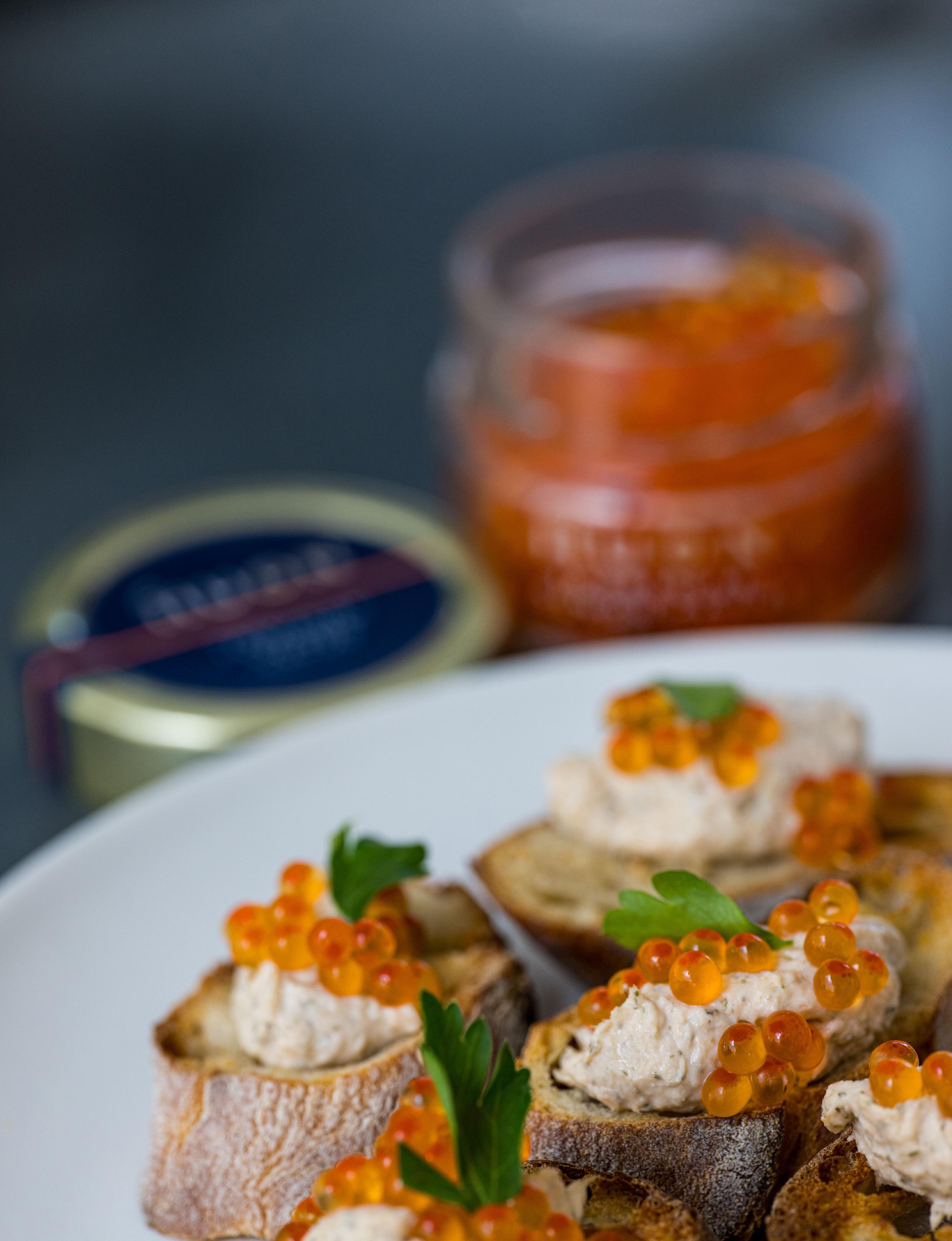
Cut baguette into slices and toast lightly.
In a food processor add smoked salmon, crème fraiche, lemon juice, lemon zest, mustard, and tarragon. Blend until smooth.
Spoon one teaspoon of salmon pate onto the toasted sourdough once cooled.
Garnish with caviar and flat leaf parsley to serve.